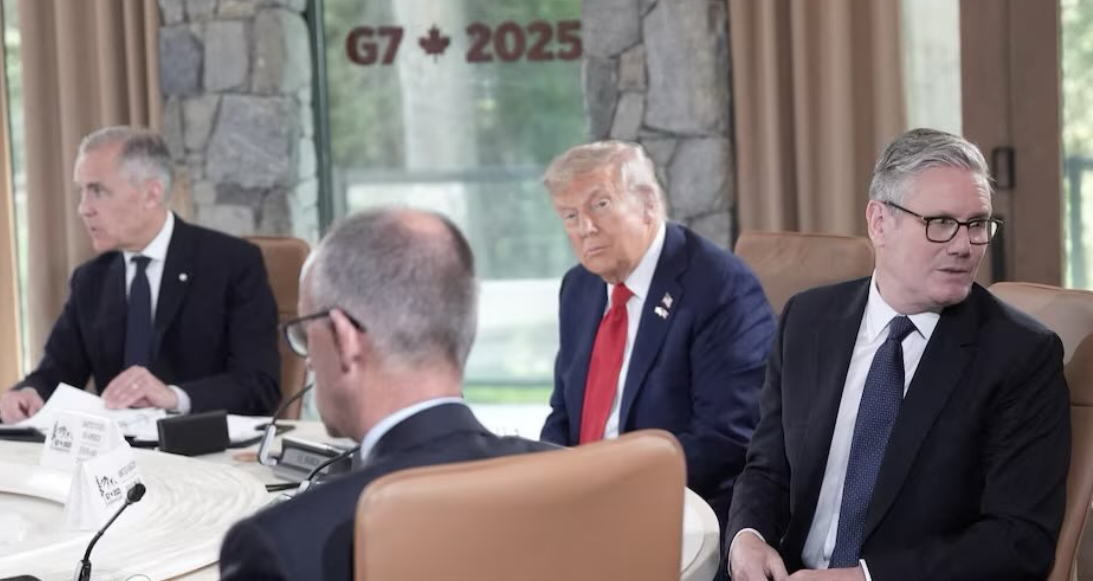G7 Leaders Call for De-escalation in Israel-Iran War:G7 leaders have issued a joint statement urging de-escalation in the ongoing Israel-Iran war, stressing Israel’s right to self-defense while firmly declaring that Iran must never acquire a nuclear weapon. The statement calls for a peaceful resolution and broader de-escalation in West Asia as tensions continue to rise. U.S. President Donald Trump is also leaving the G7 summit early due to urgent matters, highlighting the seriousness of the situation.
G7 Leaders Call for De-escalation in Israel-Iran War
In a significant development amid the ongoing conflict between Israel and Iran, G7 leaders have issued a joint statement urging for immediate de-escalation of hostilities in West Asia. The leaders, representing seven of the world’s major advanced economies, expressed deep concern over the escalating violence and stressed the urgent need for a peaceful resolution to avoid further destabilization in the region.
G7 leaders’ Statements: 1) Affirm their support for Israel and its “right to defend itself” 2)Urge de-escalation between Israel and Iran 3)Stress Iran can never have a nuclear weapon
The joint statement clearly emphasized that Israel retains the right to defend itself against aggression. This endorsement of Israel’s self-defense right comes as both nations continue to exchange strikes, raising fears of a wider conflict that could draw in regional and global powers. The G7 leaders’ statement reflects the complex balancing act between supporting an ally’s security and calling for restraint to prevent the war from spiraling further.
Crucially, the G7 leaders also issued a strong and unequivocal message regarding Iran’s nuclear ambitions. The statement firmly asserted that “Iran can never have a nuclear weapon.” This long-standing position reflects growing international anxiety that any further escalation in the current war might serve as a pretext or cover for advancing nuclear programs, which could have far-reaching consequences for global security.
The G7 leaders stressed that while Israel has every right to protect itself, diplomatic channels must remain open, and every effort must be made to achieve a negotiated solution. The statement called for all parties involved to work toward a resolution of the ongoing crisis, leading to a broader de-escalation of hostilities in the volatile West Asian region.
Meanwhile, in a related development, U.S. President Donald Trump, who was attending the G7 summit, announced that he would be departing a day earlier than scheduled. Citing urgent matters requiring his immediate attention back home, Trump is set to leave following the state dinner with fellow heads of state. His early departure underscores the serious and rapidly evolving nature of the situation.
Meanwhile, in a 50-minute call, Putin told Trump he condemns Israel’s military operation against Iran and warned it could spiral into something with “unpredictable consequences.” Further, President Trump says Russia should be part of the G7. “You wouldn’t have a war right now if you had Russia in.”
As tensions remain high, the international community continues to watch closely, hoping that diplomatic efforts will prevail over further military escalation. The G7’s united call for de-escalation and its firm stance on Iran’s nuclear program reflect the gravity of the crisis and the urgent need for all sides to step back from the brink.
Disclaimer:
The information provided in this article is based on current news reports, official statements, and developments available at the time of publication. The ongoing Israel-Iran conflict is a rapidly evolving situation, and details may change as new information emerges. This article is intended for informational and analytical purposes only and does not represent any political stance or endorsement of any party involved. Readers are advised to refer to multiple sources and official updates for the most accurate and up-to-date information. The views expressed herein do not constitute professional, legal, or diplomatic advice. The blog, its authors, and affiliates disclaim any liability for decisions made based on the contents of this article.

